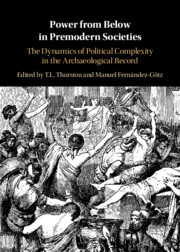 Power from Below in Premodern Societies
Power from Below in Premodern Societies Book contents
- Power from Below in Premodern Societies
- Power from Below in Premodern Societies
- Copyright page
- Contents
- Figures
- Contributors
- Preface
- One Power from Below in the Archaeological Record
- Two Fragmenting Trypillian Megasites
- Three Structure and Agency
- Four Power Requires Others
- Five “And Make Some Other Man Our King”
- Six Societies against the Chief? Re-Examining the Value of “Heterarchy” as a Concept for Studying European Iron Age Societies
- Seven Peasants, Agricultural Intensification, and Collective Action in Premodern States
- Eight The Spread of Scribal Literacy in Han China
- Nine Confronting Leviathan
- Ten The Emergence of Monte Albán
- Eleven Dispersing Power
- Twelve The Perplexing Heterarchical Complexity of New Guinea Fisher-Forager Polities at Contact
- Thirteen Restoring Disorder
- Index
- References
Ten - The Emergence of Monte Albán
A Social Innovation That Lasted a Millennium
Published online by Cambridge University Press: 08 October 2021
- Power from Below in Premodern Societies
- Power from Below in Premodern Societies
- Copyright page
- Contents
- Figures
- Contributors
- Preface
- One Power from Below in the Archaeological Record
- Two Fragmenting Trypillian Megasites
- Three Structure and Agency
- Four Power Requires Others
- Five “And Make Some Other Man Our King”
- Six Societies against the Chief? Re-Examining the Value of “Heterarchy” as a Concept for Studying European Iron Age Societies
- Seven Peasants, Agricultural Intensification, and Collective Action in Premodern States
- Eight The Spread of Scribal Literacy in Han China
- Nine Confronting Leviathan
- Ten The Emergence of Monte Albán
- Eleven Dispersing Power
- Twelve The Perplexing Heterarchical Complexity of New Guinea Fisher-Forager Polities at Contact
- Thirteen Restoring Disorder
- Index
- References
Summary
Monte Albán, one of Mexico’s earliest cities, was founded in the Valley of Oaxaca around 500 bc as a central fulcrum in a dynamic episode of change that grounds subsequent regional history. Proposed explanations for the establishment of Monte Albán are numerous and diverse; yet, to date, they tend to emphasize only the agency of the elite. Here, we offer new theoretical perspectives on the dynamic processes associated with this multifaceted, transitional episode. Adopting a multiscalar approach, we view this transition as the outcome of innovative social negotiations that yielded new opportunities and social contracts that ultimately advantaged both certain powerful individuals as well as larger segments of the population. The collective mode of governance that was instituted (ca. 500 bc) at this early Mesoamerican city proved to be resilient, enduring for more than a millennium, despite challenges, adjustments, and changes over time.
- Type
- Chapter
- Information
- Power from Below in Premodern SocietiesThe Dynamics of Political Complexity in the Archaeological Record, pp. 220 - 246Publisher: Cambridge University PressPrint publication year: 2021
References
- 3
- Cited by
